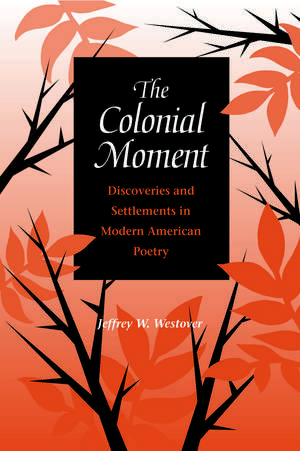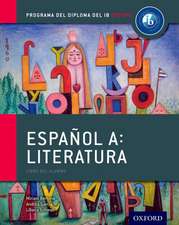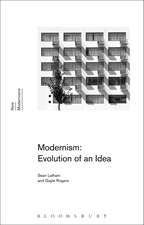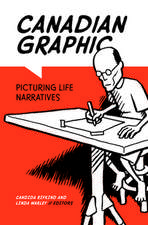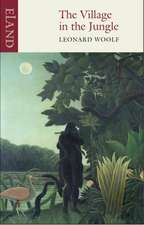The Colonial Moment: Discoveries and Settlements in Modern American Poetry
Autor Jeffrey W. Westoveren Limba Engleză Hardback – 25 iul 2004
Explorers, colonists, native peoples—all played a role in early American settlement, and the legacy they left was a turbulent one. During the first three decades of the twentieth century, as the United States asserted itself as a world power, poets began to revisit this legacy and to create their own interpretations of national history. In The Colonial Moment, Jeffrey Westover shows how five major poets—Marianne Moore, William Carlos Williams, Robert Frost, Hart Crane, and Langston Hughes—drew from national conflicts to assess America's new role as world leader.
Sensitive to the nation's memory of colonial brutality, these poets mingled their pride in America with moral protest against racism. Some identified a dark side to the nation's history, particularly in the conflicts between white pioneers and Native Americans, that haunted their otherwise confident celebrations of patriotism. Others used poetry as a vehicle of discovery to challenge existing historical accounts or to criticize the failures of American democracy. Investigating these five major writers in terms of their cultural and political moment, Westover demonstrates how they dramatized the process of nation-building.
Colonization inevitably results in a sense of displacement. Each of these five poets struggled with such cultural alienation—especially those who belonged to a racial, sexual, or gender minority. They endeavored to unite their voices in a "vocabulary of the national," a search to define the concept of "we" that would encompass all modern readers while recognizing those whom previous generations had dismissed. In this way, each writer hoped to redeem the country's losses symbolically through language.
Sensitive to the nation's memory of colonial brutality, these poets mingled their pride in America with moral protest against racism. Some identified a dark side to the nation's history, particularly in the conflicts between white pioneers and Native Americans, that haunted their otherwise confident celebrations of patriotism. Others used poetry as a vehicle of discovery to challenge existing historical accounts or to criticize the failures of American democracy. Investigating these five major writers in terms of their cultural and political moment, Westover demonstrates how they dramatized the process of nation-building.
Colonization inevitably results in a sense of displacement. Each of these five poets struggled with such cultural alienation—especially those who belonged to a racial, sexual, or gender minority. They endeavored to unite their voices in a "vocabulary of the national," a search to define the concept of "we" that would encompass all modern readers while recognizing those whom previous generations had dismissed. In this way, each writer hoped to redeem the country's losses symbolically through language.
Preț: 366.24 lei
Nou
Puncte Express: 549
Preț estimativ în valută:
70.08€ • 74.94$ • 58.43£
70.08€ • 74.94$ • 58.43£
Carte tipărită la comandă
Livrare economică 17 aprilie-01 mai
Preluare comenzi: 021 569.72.76
Specificații
ISBN-13: 9780875803258
ISBN-10: 0875803253
Pagini: 246
Dimensiuni: 152 x 229 x 25 mm
Greutate: 0.52 kg
Ediția:1
Editura: Northern Illinois University Press
Colecția Northern Illinois University Press
ISBN-10: 0875803253
Pagini: 246
Dimensiuni: 152 x 229 x 25 mm
Greutate: 0.52 kg
Ediția:1
Editura: Northern Illinois University Press
Colecția Northern Illinois University Press
Recenzii
"A very useful and thought-provoking book."—South Atlantic Review
"Westover's study is as theoretically well informed and sensible as it is poetically sensitive."—Choice
"The Colonial Moment provides a persuasive portrait of several early modernist poets as sharing a tendency to mythologize and de-mythologize questions of nationality and origins in their poetic representations of their own age and values."—Modernism/Modernity
"Westover's study is as theoretically well informed and sensible as it is poetically sensitive."—Choice
"The Colonial Moment provides a persuasive portrait of several early modernist poets as sharing a tendency to mythologize and de-mythologize questions of nationality and origins in their poetic representations of their own age and values."—Modernism/Modernity
Notă biografică
Jeffrey W. Westover is Assistant Professor of American Literature at Howard University. He has published articles on the poetry of James Merrill and the fiction of Henry James and Herman Melville.
Cuprins
Table of Contents
Acknowledgments
Introduction: Discoveries and Settlements in Modern American Poetry
1. Marianne Moore's Geography of Origins
2. Nation and Enunciation in the Work of William Carlos Williams
3. National Forgetting and Remembering in the Poetry of Robert Frost
4. Empire and America in the Poetry of Hart Crane
5. Fragmentation and Diaspora in the Work of Langston Hughes
Epilogue: "We the People" in an Imperial Republic
Notes
Works Cited
Index
Introduction: Discoveries and Settlements in Modern American Poetry
1. Marianne Moore's Geography of Origins
2. Nation and Enunciation in the Work of William Carlos Williams
3. National Forgetting and Remembering in the Poetry of Robert Frost
4. Empire and America in the Poetry of Hart Crane
5. Fragmentation and Diaspora in the Work of Langston Hughes
Epilogue: "We the People" in an Imperial Republic
Notes
Works Cited
Index
Descriere
Explorers, colonists, native peoples—all played a role in early American settlement, and the legacy they left was a turbulent one. During the first three decades of the twentieth century, as the United States asserted itself as a world power, poets began to revisit this legacy and to create their own interpretations of national history. In The Colonial Moment, Jeffrey Westover shows how five major poets—Marianne Moore, William Carlos Williams, Robert Frost, Hart Crane, and Langston Hughes—drew from national conflicts to assess America's new role as world leader.
Sensitive to the nation's memory of colonial brutality, these poets mingled their pride in America with moral protest against racism. Some identified a dark side to the nation's history, particularly in the conflicts between white pioneers and Native Americans, that haunted their otherwise confident celebrations of patriotism. Others used poetry as a vehicle of discovery to challenge existing historical accounts or to criticize the failures of American democracy. Investigating these five major writers in terms of their cultural and political moment, Westover demonstrates how they dramatized the process of nation-building.
Colonization inevitably results in a sense of displacement. Each of these five poets struggled with such cultural alienation—especially those who belonged to a racial, sexual, or gender minority. They endeavored to unite their voices in a "vocabulary of the national," a search to define the concept of "we" that would encompass all modern readers while recognizing those whom previous generations had dismissed. In this way, each writer hoped to redeem the country's losses symbolically through language.
Sensitive to the nation's memory of colonial brutality, these poets mingled their pride in America with moral protest against racism. Some identified a dark side to the nation's history, particularly in the conflicts between white pioneers and Native Americans, that haunted their otherwise confident celebrations of patriotism. Others used poetry as a vehicle of discovery to challenge existing historical accounts or to criticize the failures of American democracy. Investigating these five major writers in terms of their cultural and political moment, Westover demonstrates how they dramatized the process of nation-building.
Colonization inevitably results in a sense of displacement. Each of these five poets struggled with such cultural alienation—especially those who belonged to a racial, sexual, or gender minority. They endeavored to unite their voices in a "vocabulary of the national," a search to define the concept of "we" that would encompass all modern readers while recognizing those whom previous generations had dismissed. In this way, each writer hoped to redeem the country's losses symbolically through language.
